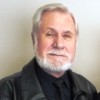|
|
 Heinz A. Volk |
Homeland Campaign Held in German
September 30 2007 / ShareHim in Penticton #218by Heinz Volk
Personal Testimony of Heinz A. Volk.
Kurt, who immigrated to Canada as a senior, had problems with the English language and frequently asked me or my wife to translate for him. He also asked if we knew of any church that conducted services in German.
One day, while I was getting some information from the Chamber of Commerce, the director volunteered that German is the third most common language spoken in the Penticton area. I thought of Kurt, and wondered if there were any others who faced the same problems. I wished I could do something for the German community, but as I had left Germany 45 years previously, I had lost my fluency in the language. Besides, after my confirmation, I never returned to the Lutheran church in which I had been brought up, and so was totally unfamiliar with theological terminology. My wife had left Germany when she was four.
That’s where ShareHim helped. I had conducted a low key campaign in my home church in Penticton, and though attendance was small, was so pleased with the results that I went on an international campaign. I noticed that the sermon graphics and notes were available in German, and after prayer, my wife and I decided to let God be with our stammering tongues and conduct a series in German that same fall, intending to have once-a-month church services afterwards. As the take-home brochures were available only in English, we translated these ourselves, fully aware of the fact that there would be some grammatical errors.
A few of our church members spoke German, and we had their support. We placed a German advertisement in the local English-language newspaper and asked all our church members to pray. Then we waited.
One evening we had an excited call from Kurt, who had noticed the ad. He had just come out of the hospital after falling and breaking his hip, but said that if he could find someone to drive him, he and his wife would attend. In total we had only 7 guests, four of them from other towns. Kurt kept saying that the meetings were like a spiritual rehab, a real feast. After the third meeting Emmy, a Mennonite lady, asked if we had services on Saturdays and if she and her husband could attend. They haven’t missed a service since.
When I spoke about the state of the dead and that the punctuation had been misplaced in Jesus’ reply to the thief on the cross, I noticed some commotion from where Emmy was sitting. Afterwards she told me, “When you said that the punctuation had been misplaced, I couldn’t help myself. I poked my husband and said, ‘See? I told you the comma was in the wrong place!’”
When I mentioned the possibility of conducting a German church service once the meetings were finished, Emmy said she would prefer to attend the English service so that she would be able to bring her grandchildren, who don’t know German. Though the members of the church they had attended previously are making a concerted effort to get Emmy and her husband to return to them, they say that they found something in the Adventist church that had been lacking in their lives.
Wanting to share what she had learned with her siblings, Emmy asked my wife to help her put the brochures into the same order in which the sermons had been presented. My wife gave her 2 copies, bound in booklet form. Emmy edited one for grammatical errors and returned it, so that we could make the necessary changes before we conducted another series. We forwarded the corrected set of brochures to ShareHim, so that others will be able to use the handouts too.
One day, while I was getting some information from the Chamber of Commerce, the director volunteered that German is the third most common language spoken in the Penticton area. I thought of Kurt, and wondered if there were any others who faced the same problems. I wished I could do something for the German community, but as I had left Germany 45 years previously, I had lost my fluency in the language. Besides, after my confirmation, I never returned to the Lutheran church in which I had been brought up, and so was totally unfamiliar with theological terminology. My wife had left Germany when she was four.
That’s where ShareHim helped. I had conducted a low key campaign in my home church in Penticton, and though attendance was small, was so pleased with the results that I went on an international campaign. I noticed that the sermon graphics and notes were available in German, and after prayer, my wife and I decided to let God be with our stammering tongues and conduct a series in German that same fall, intending to have once-a-month church services afterwards. As the take-home brochures were available only in English, we translated these ourselves, fully aware of the fact that there would be some grammatical errors.
A few of our church members spoke German, and we had their support. We placed a German advertisement in the local English-language newspaper and asked all our church members to pray. Then we waited.
One evening we had an excited call from Kurt, who had noticed the ad. He had just come out of the hospital after falling and breaking his hip, but said that if he could find someone to drive him, he and his wife would attend. In total we had only 7 guests, four of them from other towns. Kurt kept saying that the meetings were like a spiritual rehab, a real feast. After the third meeting Emmy, a Mennonite lady, asked if we had services on Saturdays and if she and her husband could attend. They haven’t missed a service since.
When I spoke about the state of the dead and that the punctuation had been misplaced in Jesus’ reply to the thief on the cross, I noticed some commotion from where Emmy was sitting. Afterwards she told me, “When you said that the punctuation had been misplaced, I couldn’t help myself. I poked my husband and said, ‘See? I told you the comma was in the wrong place!’”
When I mentioned the possibility of conducting a German church service once the meetings were finished, Emmy said she would prefer to attend the English service so that she would be able to bring her grandchildren, who don’t know German. Though the members of the church they had attended previously are making a concerted effort to get Emmy and her husband to return to them, they say that they found something in the Adventist church that had been lacking in their lives.
Wanting to share what she had learned with her siblings, Emmy asked my wife to help her put the brochures into the same order in which the sermons had been presented. My wife gave her 2 copies, bound in booklet form. Emmy edited one for grammatical errors and returned it, so that we could make the necessary changes before we conducted another series. We forwarded the corrected set of brochures to ShareHim, so that others will be able to use the handouts too.






